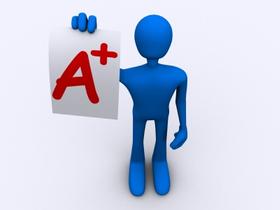"Everybody does it." Sadly that excuse is one of several reasons why there is so much cheating in America's high schools. Children learn by example. When they see adults cheating, they assume that there is nothing wrong with cheating. Adults cheat for a variety of reasons although I suspect that expediency probably tops the list of reasons why. Students seem to cheat because they are under tremendous pressure to be successful. Getting the best marks constantly so that Ivy League colleges will accept them has been many students' mantra ever since they could remember. We parents are to blame for putting that kind of pressure on our kids.
Michael Winerip's article on the cheating scandal in Philadelphia public schools underscores one of the intrinsic differences between public and private schools. Private schools do not have to teach to the test. Public schools do. That is as a result of The No Child Left Behind legislation which required that minimum test scores be attained, among other requirements. The consequences for not achieving the benchmarks are serious. The net result is that some unethical teachers and administrators are alleged to have cooked the books in the Philadelphia schools. And they got caught. A similar situation occurred in Atlanta's public schools with several educators jailed for their role in a wide-spread cheating scandal.
Private schools are not covered by NCLB or its replacement legislation the Every Student Succeeds Act. Consequently private schools do not have to teach to the test. So how are private schools held accountable? The simple answer is that they are held accountable by you their customers. Parents and students hold the power in private schools. Simply put, if you are not satisfied with the job your private school is doing, you have the freedom to withdraw your child and put her in another school. It is a bit more complicated than this, of course, but essentially market forces make schools accountable.
State Academic Standards
Another factor is the curriculum a private school uses. The curriculum which each private school uses is chosen by the school. It is not dictated by the state or some other authority. The state education departments generally require high school graduates to have a certain number of credits in core subject areas. But how those core subjects or any other subjects are taught is entirely up to the school. That is why it is so important for you to choose a school whose teaching methods and curriculum most closely align with your requirements and educational philosophy. This video discusses state-mandated high school mathematics and science graduation requirements.
Now, remember that private schools run the gamut from traditional curriculum and teaching methods to progressive curricula and teaching methods. That gives you a host of options as you seek to match your child's needs. While private schools do not, as a rule, teach to state or national states in order to comply with various legal mandates, most will prepare your child for national and international examinations such as the Advanced Placement exams and the International Baccalaureate examinations. Both of these programs require several years of intense course work in order to be successful in the examinations which take place in the latter part of your child's senior year.
I have laid all of this out in detail simply to make the point that both AP and IB examinations are virtually tamper proof. The examinations are administered locally but marked by independent professionals far removed from the school your child has attended. In other words, even if they wanted to, the local staff cannot tamper with the results.
The Forms of Cheating
I have cited a list of the ways students cheat in the list of resources at the end of this article. But the one way in which students cheat in 2015 and perhaps don't even think that they are cheating while doing so, is using other people's material as their own. It's so easy to copy and paste a paragraph from the web and forget to put it in quotations or attribute it correctly. You and I have seen how that kind of sloppiness can derail careers of our peers who otherwise seemed to have it all. Plagiarism is a topic you must discuss with your children in various ways as appropriate over the years.
Zero Tolerance Policies
The other factor which stifles most attempts at cheating in private schools is the zero tolerance policy which your school will have in place. In many cases, cheating is grounds for expulsion depending on the severity of the offence. Children mimic the behavior of others. Especially adults. If they see you cheating on your taxes, they will see nothing wrong with cheating on their math test. That's why private schools take great pains to teach and enforce ethical behavior.
Your child didn't know that cheating was an offence? Sorry but your child attended several sessions at the beginning of the school year explaining the Code of Conduct which the school's community must follow. You and she also signed a contract with the school stating that you had read, understood and agreed to abide by the Code of Conduct. No, ignorance is not bliss.
There are rules to be followed in the school community just as there are laws which must be complied with in the community outside the school. Teaching a child to be responsible is not something which can be taught in one semester. You as a parent start at a very early age and gradually widen and expand the child's understanding of the concepts of right and wrong, good behavior and bad behavior, so that he is able to become a responsible member of society. Implicit in that is that we parents must always set the right example. We also cannot pretend that cheating does not exist. We need to discuss issues such as cheating and ethics regularly with our children. We must constantly reinforce the fact that real achievement comes from hard work.
Private schools teach academics and we parents expect great results in that area. But the overarching purpose and aim of most private schools is to shape the character of their students. Most private schools will have some sentence or phrase somewhere in their mission statement which talks about educating the whole child. In any case cheating is not tolerated. Accepting responsibility for one's actions is encouraged and expected.
Questions? You may contact me via Twitter. @privateschl
More Resources























